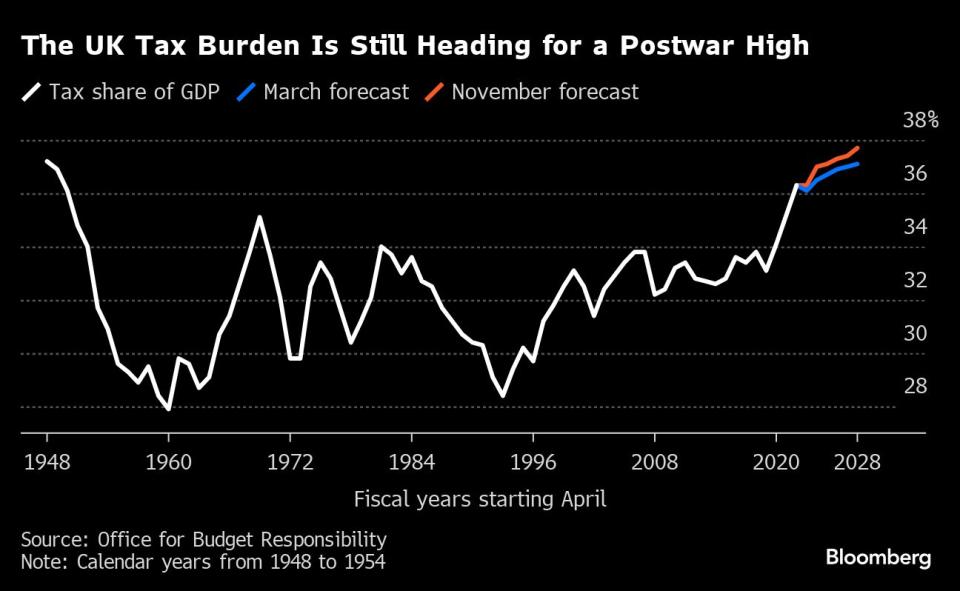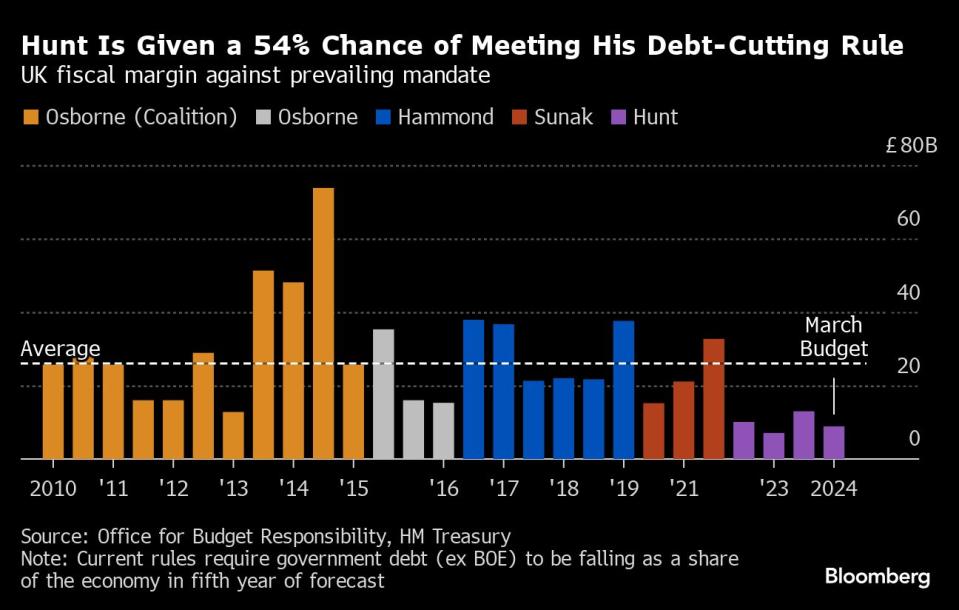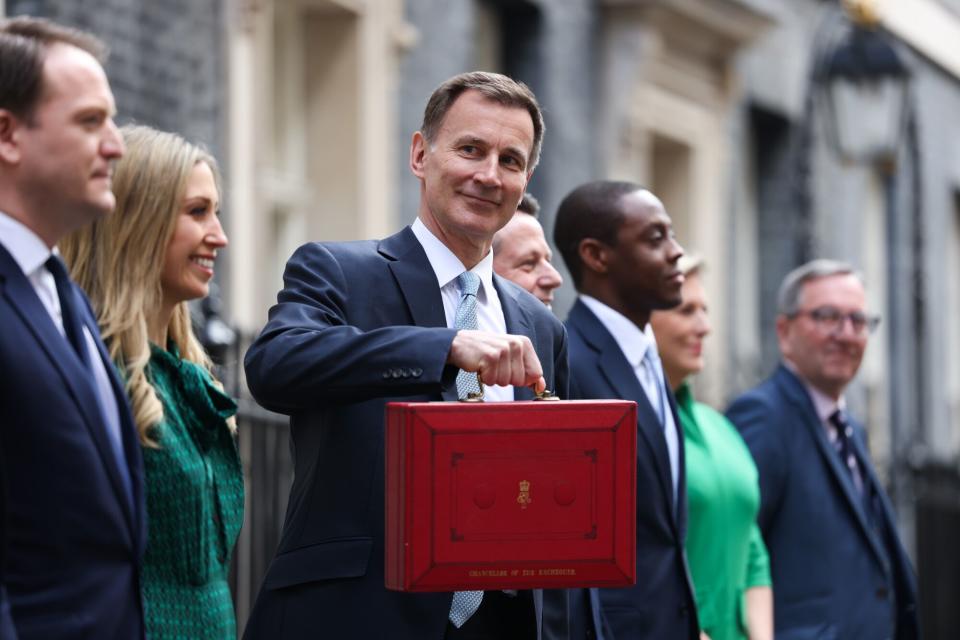Hunt Chooses Market Calm Over Tory Demands for Broader Tax Cuts
(Bloomberg) -- Jeremy Hunt cut personal taxes for the second time in four months and signaled the UK’s ruling Conservative Party will campaign on a promise to go further, as the Chancellor of the Exchequer rolled out an election-year budget that was also carefully calibrated to avoid spooking investors.
Most Read from Bloomberg
Chemical Linked to Cancer Found in Acne Creams Including Proactiv, Clearasil
How Trump’s Ex-Treasury Chief Landed 2024's Highest-Profile US Bank Deal
New York to Deploy National Guard to NYC Subways to Fight Crime
NYCB Raises More Than $1 Billion in Equity Led by Steven Mnuchin’s Firm
In his long-awaited speech, Hunt announced another 2 percentage-point cut to the national insurance payroll tax, just as he did in November. Taken together, he said, 27 million employees will get an average tax cut of £900 ($1,145) a year and the effective personal tax rate would drop to the lowest since 1975.
Read more: Here Are the Key UK Budget Measures Announced by Jeremy Hunt
“We know that lower taxed economies have more energy, more dynamism and more innovation. We know that is our future too,” Hunt said in the House of Commons. “If we want to encourage hard work, we should let people keep as much of their own money as possible.”
Hunt was under pressure from Tory lawmakers to deliver eye-catching moves ahead of an election that Prime Minister Rishi Sunak must call by January 25 at the latest, with the budget seen as one of the last remaining political set pieces to try to close a 20-point poll gap to the opposition Labour Party.
But he was constrained by fragile public finances. The UK entered a recession last year, and the chancellor went into his budget with just £12.2 billion of breathing space against his key fiscal rule, to have debt falling as a percentage of GDP at the end of the five-year forecast period. He was also battling the legacy of former Prime Minister Liz Truss, whose package of unfunded tax cuts in late 2022 rattled financial markets.
Opting to cut national insurance rather than income tax suggests fear of a Truss repeat trumped the government’s need for a big tax splash.
Sunak pledged to reduce income tax during the Conservative leadership contest in the summer of 2022, and some of his aides favored making good on that promise at this year’s budget, believing it would be noticed and understood more by voters in election year.
Yet doing so would have been more expensive than cutting national insurance, while traders were also wary it would be inflationary and make it more difficult for the Bank of England to cut rates as much as markets expect this year. The muted reaction of the gilt market suggested traders took the budget in stride.
Hunt’s measures “will likely deliver a very modest boost to GDP with few implications for inflation,” said Dan Hanson, chief UK economist at Bloomberg Economics.
The problem facing Hunt and Sunak may be more political. While more centrist Tories welcomed what they regard as a sensible budget, those calling for a bolder statement — especially on the small-state, low-tax right of the party — expressed disappointment. There was a growing consensus that the budget could not be the last fiscal intervention before the election, suggesting that speculation of a ballot as early as May is not on the cards.
“While the national insurance cut is welcome, unfortunately the budget does almost nothing to change the direction of travel toward a social democratic economy: high tax, high spend, and hence low growth,” Conservative peer David Frost said in an interview.
To be sure, Hunt still pushed the envelope. He barely kept his budget to the fiscal rules — the £8.9 billion of headroom at the end of the forecast period is the second-lowest on record — and only did so by raising taxes by extending a windfall tax on the profits of oil and gas companies and overhauling a tax break for foreigners moving to the UK.
Some Tories were alarmed at the move, both of which are Labour policies that Sunak and Hunt have previously rejected. Andrew Bowie, an energy minister, called the extension of the energy windfall tax “deeply disappointing.”
Other measures also had a pre-election feel. In a move appeared designed to get more houses onto the market, Hunt announced a reduction in property capital gains tax and the end of a tax break for people renting out second homes as short-term lets for tourists. Hunt also said the threshold at which families start to lose child benefits will rise to £60,000 from £50,000 in April.
Other budget measures included:
Freeze on fuel and alcohol duty
Consultation on a new British ISA to boost investment in UK equities
New tax on vaping
Hike in air passenger duty on business travel
An increase in the VAT registration threshold for small businesses
£6 billion of extra funding for the National Health Service
Hunt was given a boost by rosier growth forecasts from the fiscal watchdog: Hunt said growth is now due to be 0.8% in 2024, up from the previous estimate of 0.7%. The Office for Budget Responsibility is now predicting 1.9% growth for 2025, compared to a previous reading of 1.4%, he said.
Yet there are problems lying in store for the next government, whether it’s Conservative or Labour. While Hunt said he wouldn’t be reducing future public spending, critics have said the 1% planned uplift will be politically undeliverable because unprotected departments will face real terms cuts.
Hunt didn’t set out his spending plans, but said boosting public sector productivity would be a key priority. The underlying message was that the need for tax cuts trumped everything else.
Still, there are potential pitfalls in the strategy. The UK’s overall tax burden has risen close to the highest level since World War II on Hunt’s watch, and the OBR forecasts the budget measures will increase it by 1.1 percentage points.
Former Home Secretary Priti Patel said that while she “broadly” welcomed the direction of travel in the budget, the government should do more to counter so-called fiscal drag putting more workers into higher income tax brackets.
“The hidden sting in the tail is the continued frozen tax thresholds which will eat into any savings” from the national insurance cut, Christine Cairns, tax partner at PwC, said in an emailed statement.
Meanwhile polls suggest voters think tax cuts are the wrong priority. In February, a YouGov survey found 55% of Britons wanted the government to increase spending on public services if funds were available, compared to 30% who preferred tax cuts. Yet among 2019 Conservative voters, the picture was more mixed: 44% favored more public spending, with 42% backing cutting tax.
Senior Tories say a campaign built on personal tax cuts would create a clear dividing line with Labour and claw back votes from traditional Tory supporters who are considering either not voting or backing a different party.
In his response, Labour leader Keir Starmer called Sunak and Hunt the “chuckle brothers of decline” and said voters would see through the tax giveaways. He said Labour would support the national insurance tax cut, but took aim at what he described economic policy formed in Tory interests.
“The harder they try with cynical games like this, the worse it will get for them, because the whole country can see exactly who they are,” Starmer said. “Fighting for themselves, politics not governing, party first, country second.”
--With assistance from Kitty Donaldson, Irina Anghel, Naomi Tajitsu, Alice Gledhill, Ailbhe Rea and Andrew Atkinson.
Most Read from Bloomberg Businessweek
How Apple Sank About $1 Billion a Year Into a Car It Never Built
The Battle to Unseat the Aeron, the World’s Most Coveted Office Chair
Humanoid Robots at Amazon Provide Glimpse of an Automated Workplace
Immigration Rage Drowns Out the US Labor Market’s Need for Workers
©2024 Bloomberg L.P.





